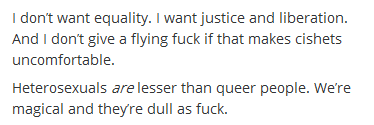Chef has apparently taken up a new career as a marketing executive


What about those weed gangsters that are mad about you giving speeches in Bumfuck, Maine?
This section allows you to view all posts made by this member. Note that you can only see posts made in areas you currently have access to.
Show posts Menu
QuoteI thought, Mr. Dorsey, that we had an understanding. I would not ever concede that telling you or anyone else they ought to die of boils was unjustifiable after their own rhetoric lapsed into abject slander, dishonesty or dishonor, and you — pretending that I had somehow threatened the actual well-being of another human, or that my words were measurably more cruel than telling someone to, say, take a long walk off a short pier or grow like an onion with his head in the ground — would continue to bar me from the demagogue-encrusted, Nazi-profiteering national agora that you call a social-media platform.
I was more than content with this bargain.
For one thing, leaving intact on Twitter my threaded suggestion that boils are your deserved fate for your civic performance in this moment would make clear why I departed months ago. No one had actually been threatened or harassed, and the rhetoric itself was purposed as a precise critique of your incompetent attempts at algorithmic censorship, which routinely ban people for the most casual sarcasm while leaving intact organized slander and disinformation. This seemed to me fair payment for my exile. For another, I was able to use the time I had previously spent on Twitter jabbering with Russian bots and assorted meme-spewing deplorati to much greater accomplishment, such as deworming my neighbor's dog and rearranging the books on my shelves by color.
At that point, we were good, and our ways, well parted.
Imagine my renewed contempt for you and all your public works when I find out from a third party that even though I declined to delete the tweet in question — which was number 10 on an 18-tweet thread explaining exactly why Twitter has managed to embrace censorship on matters of mere decorum, without having the slightest effect on any of the grave and actual offenses perpetrated on your site — your shitsquib, basement-dwelling minions simply went behind my back and unilaterally removed item #10 from the string. And get this — they did so while continuing to present me with the insistent demand that I delete the item myself in order to be reinstated.
That's right, you took it down yourself, quietly, secretly — and all the while kept pretending that until I did so you couldn't possibly return me to your platform. You gutless, cheese-eating, back-dooring fuckbonnet.
QuoteLast November, voters in New Hampshire's Lakes Region re-elected to the state house of representatives a man who appears to be one of the secret architects of the internet's misogynistic "Manosphere."
The homegrown son of a preacher, 31-year-old Robert Fisher is a Republican who represents New Hampshire's Belknap County District 9. In addition to his legislative duties, Fisher owns a local computer-repair franchise, and in his spare time, seems to have created the web's most popular online destination for pickup artistry and men's rights activists, The Red Pill, according an investigation by the Daily Beast.
An investigation into Fisher's online aliases found a trail of posts linking the lawmaker to the username Pk_atheist, the creator of The Red Pill—an online Reddit community of nearly 200,000 subscribers that promotes itself as a "discussion of sexual strategy in a culture increasingly lacking a positive identity for men."
QuoteIn manosphere-speak, the rabbit hole is feminism, which the red pill reveals to be a War on Men. In this reality, the "feminine imperative" reigns; masculinity is its victim. As a result of this power struggle, old gender dynamics formerly seen as mutually beneficial, such as marriage, have all but disappeared, but female expectations of a pedestalled life unfairly remain. A common refrain among men's rights activists is "take the pussy off the pedestal."
The Red Pill guides men as they become accustomed to this new "reality." It advocates self-improvement: the importance of diet, exercise, and constant learning. But this community also subscribes to the beliefs that women lack both intelligence and substance, are programed to cheat on their partners, and expire after the age of 30. Its darkest sections are heavy with rape denial and apologia.
QuoteIn a post from 2012, Fisher explained that the con "...is why feminism pushes to increase alimony and child support. In the USA where feminism is completely unchecked, women can meet another man and profit from having two providers instead of one. Alimony and child support will ensure her lifestyle isn't the one that suffers. The only risk a woman has for leaving her husband is if she's too old and ugly to hook another guy. But even then, the amount of money she can get from her ex-husband is almost criminal."
On The Red Pill, Fisher commonly expressed disappointment that the institutions of marriage and religion were destroyed by women's equality. He maintained that as a result of financial independence, women were no longer compelled to remain faithful and as a result, men needed to protectively adapt their sexual strategy.
"Marriage, and yes, female oppression, slut shaming, religion, these were all a means to control hypergamy [infidelity]. Marriages might be considered loveless, and women might have been unhappy, but for men it meant marriages that lasted, commitments that continued, and protection against the fickle whims of females," Fisher wrote on The Red Pill in November 2012.
QuoteOn June 23, 2012, Darren Rainey, a schizophrenic man serving time for cocaine possession, was thrown into a prison shower at the Dade Correctional Institution. The water was turned up top 180 degrees — hot enough to steep tea or cook Ramen noodles.
As punishment, four corrections officers — John Fan Fan, Cornelius Thompson, Ronald Clarke and Edwina Williams — kept Rainey in that shower for two full hours. Rainey was heard screaming "Please take me out! I can't take it anymore!" and kicking the shower door. Inmates said prison guards laughed at Rainey and shouted "Is it hot enough?"
Rainey died inside that shower. He was found crumpled on the floor. When his body was pulled out, nurses said there were burns on 90 percent of his body. A nurse said his body temperature was too high to register with a thermometer. And his skin fell off at the touch.
But in an unconscionable decision, Miami-Dade State Attorney Katherine Fernandez Rundle's office announced Friday that the four guards who oversaw what amounted to a medieval-era boiling will not be charged with a crime.
QuoteThe revelation that Russia's intelligence services hacked the computer systems of Hillary Clinton's presidential campaign in what appears an attempt to weaken her in the U.S. election against Donald Trump may seem like the stuff of conspiracy.
But the truth is far more alarming. Russia's activities aren't part of a conspiracy. They are elements of an openly stated doctrine — a resurrection of Soviet style political warfare, in which intelligence agencies seek to amplify divisions among their enemies, weakening the Western front by sowing discord and dissent whenever the opportunity presents itself.
The political warfare of the Cold War is back — in updated form, with meaner, more modern tools, including a vast state media empire in Western languages, hackers, spies, agents, useful idiots, compatriot groups, and hordes of internet trolls. The target of the hacks wasn't just Clinton. Nor is Moscow much interested in supporting Trump (willing useful idiot though he may be). What the Russians have in their sights is nothing less than the democratic fabric of American society and the integrity of the system of Western liberal values.
Russia is effectively using our democracies and our systems of rule of law against us. The method works like a computer virus. They insert a lie, a false accusation, a fabrication, an illegally-obtained private conversation — some form of kompromat — into our media, competing for ratings and ad revenue, and then they let us tear ourselves apart.
QuoteFar from being an all-powerful "spookocracy" that controls the Kremlin, Russia's intelligence services are internally divided, distracted by bureaucratic turf wars, and often produce poor quality intelligence – ultimately threatening the interests of Vladimir Putin himself.
Drawing on extensive interviews with former and current intelligence officials, "Putin's hydra: Inside Russia's intelligence services" explains how the spy agencies really work, and argues that Europe's view of them is patchy and based on outdated caricatures.
The paper punctures the myth that the agencies are the power behind the throne in Russia. They are firmly subordinated to the Kremlin, and Putin plays them off against one another. They are not a united bloc but a disparate group, whose solidarity disappears as soon as there is an opportunity to make money or avoid blame.

QuoteWhen the ground crew at Harare International Airport comes out to refuel the plane, they're horrified to see blood dripping down the fuselage. The plane's crew dismisses it. Its led by two Americans, who claim they hit a bird earlier. Somebody calls the cops.
"The ground crew refueling the plane alerted local authorities," the Zimbabwe Herald reported. "Drops of blood were coming from a door, and state security officials stationed at the airport insisted it be opened."
They make the pilot climb up the fuselage, and open the door leaking blood. What he finds: an adult male. No bird. No feathers.
"For some reason the pilot first put on latex gloves, and then opened the door, which is quite high up the aircraft," an aviation insider told the Zimbabwe Herald. "And thwack, a fully clothed body of a black man fell out."
"Thwack?" Okay. But the body only falls half-out, and for the next several hours the partially-severed arm of a dead man drips blood down the fuselage which wells into a puddle on the tarmac while things sort themselves out.
The crew probably now realize that they face a bit of a sticky wicket. A dead body onboard. Cause of death unknown. Name unknown. Nationality unknown.
QuoteThis study is an attempt at a preliminary transnational investigation of the Paneuropean Right and particularly of the covert forum, the Cercle Pinay and its complex of groups. Amongst Cercle intelligence contacts are former operatives from the American CIA, DIA and INR, Britain's MI5, MI6 and IRD, France's SDECE, Germany's BND, BfV and MAD, Holland's BVD, Belgium's Sûreté de l'Etat, SDRA and PIO, apartheid South Africa's BOSS, and the Swiss and Saudi intelligence services. Politically, the Cercle complex has interlocked with the whole panoply of international right-wing groups: the Paneuropean Union, the European Movement, CEDI, the Bilderberg Group, WACL, Opus Dei, the Moonies, Western Goals and the Heritage Foundation. Amongst the prominent politicians associated with the Cercle Pinay were Antoine Pinay, Konrad Adenauer, Archduke Otto von Habsburg, Franz Josef Strauß, Giulio Andreotti, Manuel Fraga Iribarne, Paul Vanden Boeynants, John Vorster, General Antonio de Spínola, Margaret Thatcher and Ronald Reagan.
Once the fragmented information is pieced together, the network that emerges cannot be overlooked: the Cercle complex can be seen to be an international coalition of right- wing intelligence veterans, working internationally to promote top conservative politicians who would shape the world in the 1970s and 1980s.
To take the British example, much of the destabilisation of British democracy in the 1970s can only be fully understood by analysing the international support given to groups like the Anglo-American "deniable propaganda" outlet, the Institute for the Study of Conflict. The Cercle Pinay was a major source of support for the ISC virtually from its inception on; the Cercle Pinay and the ISC also tied in with another key British group, the Foreign Affairs Research Institute, heavily funded by BOSS, apartheid South Africa's secret service. BOSS's other incursions into domestic politics in Britain, notably their smear operations against leading Liberals such as Jeremy Thorpe and Peter Hain, were a significant factor in the hijacking of British democracy in the 1970s. Three Cercle members on the FARI Board assisted FARI's actions from 1976 through to the early 1980s. FARI in many ways was the British successor to a previous Cercle operation to support South Africa; the Cercle and the ISC had been active partners in setting up a Paris-based propaganda outlet in 1974 as part of South Africa's covert media campaign later exposed in the "Muldergate" scandal.
German intelligence reports on the Cercle Pinay written in late 1979 and early 1980 which were published in Der Spiegel in 1982 also shed new light on a "Thatcher faction" within MI6 in the lead-up to the Conservatives' 1979 election victory. Whilst receiving wide publicity in France and Germany, these reports have never been covered by the British Press. This serious omission is astounding in the light of the undeniable authenticity of the reports and the startling allegations they contain: one of the German intelligence reports dated November 1979 quotes a planning paper by Crozier about a Cercle complex operation "to affect a change of government in the United Kingdom (accomplished)".

QuoteThe loosening of marijuana laws across much of the United States has increased competition from growers north of the border, apparently enough to drive down prices paid to Mexican farmers. Small-scale growers here in the state of Sinaloa, one of the country's biggest production areas, said that over the last four years the amount they receive per kilogram has fallen from $100 to $30.
The price decline appears to have led to reduced marijuana production in Mexico and a drop in trafficking to the U.S., according to officials on both sides of the border and available data.
QuoteThis was a predictable outcome of legalization, but still a big deal and welcome news. One of the major arguments for legal pot is that it will weaken drug cartels, cutting off a major source of revenue and inhibiting their ability to carry out violent acts — from mass murders to beheadings to extortion — around the world. And cannabis used to make up a significant chunk of cartels' drug export revenue: as much as 20 to 30 percent, according to previous estimates from the Mexican Institute of Competitiveness (2012) and the RAND Corporation (2010).
Will this be enough to completely eliminate drug cartels? Certainly not. These groups deal in far more than pot, including extortion and other drugs like cocaine and heroin.
Still, it will hurt. As the numbers above suggest, marijuana used to be a big source of drug cartels' revenue, and that's slowly but surely going away. It's still possible that legalization in America could produce downsides in the US, such as more cannabis abuse. But it's a potentially huge win for Mexico and other Latin American countries.

QuoteWith the caveat that I literally got up half an hour ago and so have not seen any coverage since 7am, UK time...
ISIS is also my chief suspect. The methodology could go either way, Al-Qaeda or ISIS, with Beslan, Mumbai etc. The gratuitous nature of the violence also suggests ISIS over AQ, the latter being slightly more stringent with targeting (see Charlie Hebdo, frequent AQ complaints about civilian Muslims being collateral damage etc).
According to some reports, just before I went to bed, one of the gunmen shouted "this is the fault of Hollande, he does not have to intervene in Syria" before he killed himself. I suggested, back in 2014, that if overt intervention in Syria looked to be on the cards, the strategic calculus would change for ISIS, that while they would encourage and agitate for attacks in the west, they would prefer to focus on their more immediate enemies except in the case of potential attack. In the long term, I think ISIS would always be looking at attacking the west, it has to wrest the crown from Zawahiri somehow, and beyond that, their overall ideology paints the west as enemies of Islam.
Another thing not to discount is their awareness of the refugee crisis in Europe, and how an attack could complicate the political response there or even work to inflame tensions. ISIS are remarkably media savvy, and I'd be very surprised if they weren't aware of how such an attack would, almost inevitably, be followed by calls to refuse refugees, crack down on Musims generally. That then plays directly into their propaganda. It also sends a message to the refugees - no matter how far you run, we can reach you.
QuoteAnother thing, that was mentioned in the Vice article but that I neglected to mention above. ISIS has been put under quite a bit of military pressure lately. I suspect it's more of a short-term issue than the death knell of the group, given their ability to bounce back.
That said, a large attack like this...well, it's advertising. Get more men and women joining the jihad. Convince the potential donors in the Gulf states that ISIS is leading the Islamic revolution, and so deserves their donations. An influx of recruits and money could be just what they need to turn things around in those areas where they've been taking a beating recently.
Quote from: Cain on November 10, 2015, 12:17:37 AM
So, I've just been given a green light to bully my co-workers.
QuoteSo much of feminism is a screed against civilization, science, and technology. Feminists have called Isaac Newton's Principia Mathematica a rape manual. Feminists hate the technology industry and have attacked technology in general as male rape of the natural world and/or the enforcement of patriarchy over nature. Feminists know unconciously that civilization is the greatest threat to the power of women. Civilization was developed by men, not women. Women are only along for the ride because sex and babies can't happen without them (for now). Every advancement in science and technology is a threat to women. Every advancement in science and technology brings up a step closer to freeing men from needing women. For feminists to totally restore female power, they have to completely undo the last 6000 years of civilization, science, and technology.
QuotePrime Minister Benjamin Netanyahu sparked public uproar when on Wednesday he claimed that the Mufti of Jerusalem, Haj Amin al-Husseini, was the one who planted the idea of the extermination of European Jewry in Adolf Hitler's mind. The Nazi ruler, Netanyahu said, had no intention of killing the Jews, but only to expel them.
In a speech before the World Zionist Congress in Jerusalem, Netanyahu described a meeting between Husseini and Hitler in November, 1941: "Hitler didn't want to exterminate the Jews at the time, he wanted to expel the Jew. And Haj Amin al-Husseini went to Hitler and said, 'If you expel them, they'll all come here (to Palestine).' According to Netanyahu, Hitler then asked: "What should I do with them?" and the mufti replied: "Burn them."
Netanyahu's remarks were quick to spark a social media storm, though Netanyahu made a similar claim during a Knesset speech in 2012, where he described the Husseini as "one of the leading architects" of the final solution.
The claim that Husseini was the one to initiate the extermination of European Jewry had been suggested by a number of historians at the fringes of Holocaust research, but was rejected by most accepted scholars.
QuoteAn attempt by UN officials to get countries to decriminalise the possession and use of all drugs has been foiled, the BBC can reveal.
A paper from the UN Office on Drugs and Crime (UNODC) has been withdrawn after pressure from at least one country.
The document, which was leaked, recommends that UN members consider "decriminalising drug and possession for personal consumption".
It argued "arrest and incarceration are disproportionate measures".
The document was drawn up by Dr Monica Beg, chief of the HIV/AIDs section of the UNODC in Vienna. It was prepared for an international harm reduction conference currently being held in Kuala Lumpur.
The UNODC oversees international drugs conventions and offers guidance on compliance.
Sources within the UNODC have told the BBC the document was never sanctioned by the organisation as policy. One senior figure within the agency described Dr Beg as "a middle-ranking official" who was offering a professional viewpoint.
QuoteThey want you to lift the veil pulled over your eyes by the progressives who secretly control society. Like Neo escaping the Matrix, your choice is to wake up and see how the world really is, discarding religion, subjectivity, and feminist indoctrination. Conspiracy theorists, Men's Rights Activists, Pick-Up Artists, GamerGate, even the Neoreaction: all of these communities share a common creed, tech-fluent and superficially self-aware. To outsiders, it's distinctly conservative. But they don't see themselves as conservatives at all.
Welcome to the Red Pill worldview, where the entire world is a game and the people who are winning are the best players.
They've yet to assume a formal name, remaining a loose confederation of overlapping reactionary movements resistant to (though exploited by) their would-be leaders. Most identify as libertarian, many as atheists, and they are overwhelmingly white and male. They're comfortable with progressive terminology and how technology has changed society, which puts them sharply at odds with most conservatives, who see both as a threat to traditional values. Many "Redpillers" perceive conservatism as censorious and unscientific, and instead identify with the "freethought" and "skeptic" internet communities.
QuoteThe term "cuckservative" caught the eye of puzzled observers this week amid the froth of commentary floating around the race to become the Republican nominee for president in 2016.
It has been dubbed a sign of a "raging civil war" tearing the Republican party apart, "the GamerGate" of white supremacists, and a meme expressing "a certain kind of contempt". But the dictionaries have yet to step in, leaving readers to take it apart more or less on their own.
The basics are simple: cuckold, a man with an adulterous wife or partner, and conservative, which in context means someone on the spectrum of 21st-century Republican thought.
The insult's most general gist is conservatives accused of bowing to one non-conservative idea or another, eg immigration reform, should feel humiliated, their ideology adulterated.
Former Florida governor Jeb Bush is thus accused of cuckservatism for supporting a path to citizenship for immigrants, rather than the "big, beautiful wall" to enclose the United States, as endorsed by Donald Trump in last week's GOP debate.
Radio host Rush Limbaugh alluded to the meme in praise of Trump on Wednesday, saying that "if Trump were your average, ordinary, cuckolded Republican, he would have apologized by now" for criticizing Fox News host Megyn Kelly. In this sense, as it's used to criticize mainstream Republicans, the insult is an update on the "Rino" ("Republican in name only").
Mostly, the word is used to belittle conservatives for a perceived weakness, for instance as an emasculation of Fox host Bill O'Reilly for "daring to question" Trump.
QuoteAt present, "cuckservative" is just one more signal of how the contemporary Republican Party and movement conservatism have become a carnival-like human zoo fueled by the talk-radio echo chamber, one where extremism is now mainstream, and the politically adolescent and immature obsessions of "men's rights" victimologists — with their "alpha males" and "cuckolding" anxieties — are considered reasonable and respectable points of view.
The convergence of white supremacy and conservatism in the modern Republican Party — spurred in part by a renaissance of toxic white masculinity — has produced what, in the moment, appears to be a series of never-ending climaxes and crescendos wherein new levels of absurdity and paranoia replace previous peaks once thought unattainable. The extreme has become the new normal for mainstream American conservatism. As the Republican Party continues its death-spiral embrace of fascism, misogyny, patriarchy, and racism, the political insanity embodied by concepts such as "cuckservative" will become the new normal.


QuoteThe investigation that followed lifted the lid off a bizarre underworld that few Florentines knew existed in the lovely hills surrounding their city. In Italy, most young people live at home with their parents until they marry, and most marry late. As a result, having sex in parked cars is a national pastime. It has been said that one out of every three Florentines alive today was conceived in a car. On any given weekend night the hills surrounding Florence were filled with young couples parked in shadowy lanes and dirt turnouts, in olive groves and farmers' fields.
The investigators discovered that dozens of voyeurs prowled the countryside spying on these couples. Locally, these voyeurs were known as Indiani, or Indians, because they crept around in the dark. Some carried sophisticated electronic equipment, including parabolic and suction-cup microphones, tape recorders, and night vision cameras . The Indiani had divided the hills into zones of operation, each managed by a group or "tribe" who controlled the best posts for vicarious sex-watching . Some posts were highly sought after, either because they allowed for very close observation or because they were where the "good cars" were most commonly found. (A "good car" is exactly what you might imagine.) A good car could also be a source of money, and sometimes good cars were bought and sold on the spot, in a kind of depraved bourse, in which one Indiano would retire with a fistful of cash, ceding his post to another to watch the finish. Wealthy Indiani often paid for a guide to take them to the best spots and minimize the risk.
Then there were the intrepid people who preyed on the Indiani themselves, a subculture within a subculture. These men crept into the hills at night not to watch lovers but to spy on Indiani, taking careful note of their cars, license plate numbers, and other telling details— and then they would blackmail the Indiani, threatening to expose their nocturnal activities to their wives, families , and employers. It sometimes happened that an Indiano would have his voyeuristic bliss interrupted by the flash of a nearby camera; the next day he would receive a call: "Remember that flash in the woods last night? The photo came out beautifully, you look simply marvelous , a likeness that even your second cousin would recognize! By the way, the negative is for sale . . ."
QuoteOne day he learned from a beat cop that investigators had questioned and released an odd character who had been passing himself off as a medical examiner. Spezi found the story charming and pursued it for the paper . The man was "Dr." Carlo Santangelo, a thirty-six-year-old Florentine, of pleasing appearance, a lover of solitude, separated from his wife, who went about dressed in black wearing eyeglasses with smoked lenses, gripping a doctor's bag in his left hand.
In the ever-present doctor's bag were the tools of his profession, a number of perfectly honed and glistening scalpels. Instead of maintaining an established residence, Dr. Santangelo preferred to pass his days in various hotels or residences in small towns near Florence. And when he chose a hotel, he made sure it was near a small cemetery. If there was a room with a view of the tombstones, so much the better.
Dr. Santangelo's face, eyes covered with thick dark lenses, had become familiar to the staff of OFISA, the most prominent funeral establishment in Florence, where he often passed his hours as if on important business. The doctor with the dark lenses doled out prescriptions, saw patients, and even ran a psychoanalysis business on the side.
The only problem was, Dr. Santangelo wasn't a medical examiner or pathologist. He wasn't even a physician, although he seems to have taken it upon himself to operate on live people, at least according to one witness. Santangelo was unmasked when a serious car accident took place on the autostrada south of Florence, and somebody remembered that in a hotel nearby there lived a doctor. Dr. Santangelo was fetched to provide first aid, and all were amazed to hear that he was none other than the medical examiner who had performed the autopsies on the bodies of Susanna Cambi and Stefano Baldi, the Monster's latest victims. At least that was what several employees of the hotel said they had heard directly from Dr. Santangelo himself, when he had proudly opened his bag and showed them the tools of his profession.
Santangelo's peculiar claim got back to the carabinieri, and it didn't take them long to find out that he was no doctor. They learned of his predilection for small cemeteries and pathology rooms, and, even more alarming, his penchant for scalpels. The carabinieri promptly hauled Santangelo in for questioning. The phony medical examiner freely admitted to being a liar and spinner of tall tales, although he wasn't able to explain his love for cemeteries at night.
He hotly denied as libel, however, the story his girlfriend told of how he had broken off a night of passionate lovemaking by taking a dose of sleeping pills, saying this was the only way he could resist the temptation to leave his bed of love to take a turn around the tombstones.
QuotePolice detectives also took the Savonarola theory seriously, and quietly began looking into certain priests known to have odd or unusual habits. Several Florentine prostitutes told police that from time to time they entertained a priest with rather eccentric tastes. He paid them generously, not for normal sex, but for the privilege of shaving off their pubic hair.
The police were interested, reasoning that here was a man who enjoyed working with a razor in that particular area. The girls were able to give the police his name and address. One crisp Sunday morning , a small group of police and carabinieri in plainclothes, led by a pair of magistrates, entered an ancient country church perched among cypresses in the lovely hills southwest of Florence. The committee was received in the sacristy, where the priest was in the act of dressing in his robes, taking up the sacred vestments with which he was about to say Mass. They showed him a warrant and told him the reason for their visit, stating their intention to search the church, grounds, confessionals, altars, reliquaries, and tabernacle.
The priest staggered and almost fell to the floor in a faint. He didn't try even for a moment to deny his nocturnal avocation as a barber for ladies, but he swore in the strongest terms that he wasn't the Monster. He said he understood why they had to search the premises, but he begged them to keep the reason for their visit secret and delay the search until after he had said Mass.
QuoteThe Chicago police department operates an off-the-books interrogation compound, rendering Americans unable to be found by family or attorneys while locked inside what lawyers say is the domestic equivalent of a CIA black site.
The facility, a nondescript warehouse on Chicago's west side known as Homan Square, has long been the scene of secretive work by special police units. Interviews with local attorneys and one protester who spent the better part of a day shackled in Homan Square describe operations that deny access to basic constitutional rights.
Alleged police practices at Homan Square, according to those familiar with the facility who spoke out to the Guardian after its investigation into Chicago police abuse, include:
Keeping arrestees out of official booking databases.
Beating by police, resulting in head wounds.
Shackling for prolonged periods.
Denying attorneys access to the "secure" facility.
Holding people without legal counsel for between 12 and 24 hours, including people as young as 15.
At least one man was found unresponsive in a Homan Square "interview room" and later pronounced dead.
QuoteA digital leak to Al Jazeera of hundreds of secret intelligence documents from the world's spy agencies has offered an unprecedented insight into operational dealings of the shadowy and highly politicised realm of global espionage.
Over the coming days, Al Jazeera's Investigative Unit is publishing The Spy Cables, in collaboration with The Guardian newspaper.
Spanning a period from 2006 until December 2014, they include detailed briefings and internal analyses written by operatives of South Africa's State Security Agency (SSA). They also reveal the South Africans' secret correspondence with the US intelligence agency, the CIA, Britain's MI6, Israel's Mossad, Russia's FSB and Iran's operatives, as well as dozens of other services from Asia to the Middle East and Africa.
Among the revelations, the Spy Cables disclose how:
Israel's Mossad told its allies that Iran was not working to produce nuclear weapons just a month after Prime Minister Benjamin Netanyahu warned it was barely a year from being able to do so;
The CIA made attempts to contact Hamas directly despite the US government listing the Palestinian group as a "terrorist organisation";
Britain's MI6 sought South African help in an operation to recruit a North Korean official who had previously refused their cash; and
South African and Ethiopian spies struggled to "neutralise" an assassination plot targeting a leading African diplomat.
The files unveil details of how, as the post-apartheid South African state grappled with the challenges of forging new security services, the country became vulnerable to foreign espionage and inundated with warnings related to the US "War on Terror".
Following the 9/11 attacks, South African spies were flooded with requests related to al-Qaeda, despite their own intelligence gathering and analysis telling them that they faced minimal direct threats from such groups, and that the main threat of violence on South African soil came from domestic far-right groups.
QuoteRoberta Jacobson, the assistant secretary of state in charge of the western hemisphere, who has previously served as the State Department's coordinator for Cuban affairs, will be leading the US delegation. The meetings she will lead, which begin on Wednesday, will be the first steps toward normalising diplomatic relations between the two countries.
A senior State Department official said on Monday that the US was "looking forward to the Cubans lifting travel restrictions and caps on personnel", and that the next step, the upgrading of the US mission to full embassy status, could happen "quickly" following this week's talks.
QuoteObama's State of the Union, you see, will call for $320 billion of new taxes on rentiers, their heirs, and the big banks to pay for $175 billion of tax credits that will reward work. In other words, it's fighting a two-front war against a Piketty-style oligarchy where today's hedge funders become tomorrow's trust funders. First, it's trying to slow the seemingly endless accumulation of wealth among the top 1, and really the top 0.1, no actually the top 0.001, percent by raising capital gains taxes on them while they're living and raising them on their heirs when they're dead. And second, it's trying to help the middle help itself by subsidizing work, child care, and education.
QuoteBut now that the FCC is moving toward issuing a tough net neutrality order that would subject broadband to utility-style regulation — an approach endorsed by President Barack Obama — top Republicans in both chambers are making plans to legislate their own rules to ensure the agency doesn't go too far.
"Times have changed," Rep. Greg Walden (R-Ore.), the chairman of the House telecom subcommittee, said when asked about the evolving GOP position on net neutrality. "The administration has latched onto this [utility-style regulation], and the FCC's independence is nominal at best."
QuoteThe Islamic State of Iraq and al-Sham (ISIS) is not the only Salafi-Jihadist threat emanating from Syria. Its prominence in U.S. policy has overshadowed a threat of similar magnitude from Jabhat al-Nusra (JN), the official al-Qaeda (AQ) affiliate in Syria. JN rivals ISIS as a sophisticated, intelligent, strategic actor in the region and continues to enjoy a dangerous freedom to operate in Syria. The two groups share common goals, including a revived Islamic Caliphate. JN, however, is pursuing its aims through a distinct, more patient methodology that is highly threatening despite its low signature. Whereas ISIS has announced its state and tried to legitimize it by conquest, JN is following AQ leader Ayman al-Zawahiri's method of fomenting a religious and social revolution by embedding itself within an indigenous insurgency. The Syrian war has provided JN a nearly ideal environment within which to implement this strategy on behalf of al-Qaeda, and JN has enjoyed worrying success to date.
QuoteGEOPOLITICS IS BACK. AS 2015 BEGINS, POLITICAL CONFLICT AMONG THE WORLD'S GREAT POWERS IS IN PLAY MORE THAN AT ANY TIME SINCE THE END OF THE COLD WAR.
US relations with Russia are fully broken. China is charting its own course.The ties that bind Europe are fraying on multiple fronts. Others—Gulf Arabs, Brazil, India—are hedging their plans and alliances in reaction to increasing geopolitical uncertainty. Ultimately these realignments will reshape the world order, but for now their impacts, while noteworthy, are more regional than global. China's rise still matters less than the headlines imply. Yes, it's the leading trade partner for more than 100 nations, but China's political, security, and economic influence remains underdeveloped.
It will grow quickly, but we're not there yet. Crises in the Middle East have produced a world with more refugees than at any time since the Second World War, though with muted implications elsewhere, especially given the newly limited relationship between Middle East turmoil and energy markets. Russian revisionism is a direct threat to swathes of Europe, much less so farther afield. And most of Europe has far too much keeping them busy at home.
QuoteOr at least, it's a likely candidate for three of the consulting firm's forecast trends to intersect: European political instability, Russian intransigence, and the weaponization of finance.
With Europe's economy still stagnant after the financial crisis, there are already fears that populist political movements will create uncertainty in the EU. Meanwhile, Russia isn't letting up on its aggressive anti-Western policy, despite a currency crisis and recession. President Vladimir Putin will continue to put economic pressure on Europeans, even as the US pushes for—or refuses to relax—existing financial sanctions that are hurting Russia, but also making life difficult in Europe.
And all of that could come into sharp focus in Moldova, a post-Soviet republic that is expected to continue moving toward integration with the European Union after pro-EU politicians there won a December election. Of course, those are the same sorts of agreements that precipitated Russia's invasion of Ukraine last year. And Russia already has a break-away province in Moldova—Transnistria, a Russian enclave protected by some 2,000 troops.
QuoteBest known for its financial allure, symbolized by Dubai's skyscrapers, the U.A.E. is starting to flex its military and diplomatic muscles too. In the past year it has helped consolidate an army-installed government in Egypt and is said to have sent planes to bomb Islamists in Libya, as well as joining the U.S. campaign against militants in Syria.
With traditional Arab powers mired in war or political turmoil, and U.S. attention drifting elsewhere, there's room for oil-rich Gulf states to exert more influence over the Middle East. The U.A.E. promotes itself as a template of economic success built on a liberal social model, though oil wealth and a small population may limit its relevance as a regional model, while rights groups question the extent of its tolerance.
"The role the U.A.E. wants to play is to be a leader of ideas," said Mishaal Al Gergawi, managing director of the Delma Institute, a research center in Abu Dhabi. "You look at the U.A.E. and it breaks the taboo that Arabs can attempt something and not mess it up."
QuoteTransnational Crime affects peace and stability operations– whether smuggling, such as drugs, arms, and natural resources or human trafficking – all of it undermines any state – most of which can ill afford to deal with it (or may be in the thick of it to support its corrupt leaders). Transnational crime further affects the ability of foreign intervention be successful. As the author observes, "Tackling corruption, neutralizing spoilers, and increasing the societies' culture of lawfulness are necessary steps to save West Africa." Guinea Bissau is contributing to regional and
global instability. When looking at known transnational crime smuggling routes – Guinea Bissau is front and center and the U.S. has identified as Africa's first narco-state. The author argues that the U.S. must deal with Guinea Bissau or lose West Africa – a region currently plagued by a public health disaster. And, the author provides recommendations that built upon existing cultural values to strengthen Guinea Bissau and "shed the burden of drug smuggling." It is our pleasure to bring to you this monograph.
QuoteYogi Berra, the legendary American baseball player known for his pithy quotes, once remarked: "In theory there is no difference between theory and practice; but in practice there is." India's recent pitch for an Indian Ocean Zone of Peace (IOZOP) at the Galle dialogue in Sri Lanka is a classic example of theoretical propositions not always meeting the test of practical utility. In principle, the proposal to declare the Indian Ocean Region (IOR) as a zone of peace is strikingly apposite. Increasing Chinese presence and the threat of PLA-N bases in the IOR, the growing interests of other major powers (U.S., U.K., Russia, France and Japan) in the region, and the many Chinese infrastructure projects in the region, create an imperative for India to actively limit the military maritime activity of external powers in the region. But attempting to do so through the IOZOP route will ensure that while no military activity is ever practically curtailed, Indian influence and credibility in the region will be severely eroded.
QuoteThe Army plans to send a brigade of tanks and fighting vehicles into Europe by the end of this year, according to the top Army commander in the region.
Quote"We must love all nations as we love our own," writes Russian philosopher Vladimir Sergeevich Solovyov in his 1897 book The Justification of the Good. The "greatness and value" of nationality, he claims, lies "not in itself taken in the abstract, but in something universal, supernational ... Nations live and act not for their own sake ... but for the sake ... of what can be of service to all." - See more at: http://cips.uottawa.ca/the-putin-book-club/#sthash.uf8hBGnr.dpuf
QuoteIR has long been regarded as an Anglo-American social science. Recently, the discipline has started to look beyond America and England, to China (Theory Talk #51, Theory Talk #45), India (Theory Talk #63, Theory Talk #42), Africa (Theory Talk #57, Theory Talk #10) and elsewhere for non-Western perspectives on international affairs and IR theory. However, IR theorists have paid little attention to Russian perspectives on the discipline and practice of international relations. We offer an exciting peek into Russian geopolitical theory through an interview with the controversial Russian geopolitical thinker Alexander Dugin, founder of the International Eurasian Movement and allegedly an important influence on Putin's foreign policy. In this Talk, Dugin—among others—discusses his Theory of a Multipolar World, offers a staunch critique of western and liberal IR, and lays out Russia's unique contribution to the landscape of IR theory.
QuoteTransnistria (Transdniester Moldovan Republic/TDMR or in Russian, Pridnestrovskaya Moldovskaya Respublika/PMR) – popularly referred to as a Soviet open air museum, is a strip of land holding de facto independence sandwiched between Moldova and Ukraine in Eastern Europe. Not recognised by any sovereign state, it has split from the Republic of Moldova and operates with its own government, police, and military forces. Transnistrian citizens even hold their own passports, albeit only being able to use them internally. However, Transnistria would not be able to maintain its political bargaining power without heavy support from Big Bear Russia. In light of recent events in Crimea, and in Ukraine, Transnistria becomes an interesting historical case to explore how Russia's strategic interests are injected into vulnerable territories.
QuoteThere must be something particularly trustworthy about the Jordanian journalist Fouad Hussein. After all, he has managed to get some of the the most sought after terrorists to open up to him. Maybe it helped that they spent time together in prison many years ago -- when Hussein was a political prisoner he successfully negotiated for Abu Musab al-Zarqawi to be released from solitary confinement. Or is it because of the honest and direct way in which he puts his ideas onto paper? Whatever the reason, the result is that a film which Hussein made about al-Zarqawi has even been shown on al-Qaida affiliated Web sites. "That showed me that they at least felt understood," the journalist says.
QuotePARIS — The bloody denouement on Friday of two hostage crises at different ends of a traumatized Paris means attention will now shift to the gaping question facing the French government: How did several jihadists — and possibly a larger cell of co-conspirators — manage to evade surveillance and execute a bold attack despite being well known to the country's police and intelligence services?
On its own, the Wednesday morning slaughter that left 12 people dead at the satirical newspaper Charlie Hebdo represented a major breakdown for French security and intelligence forces, especially after the authorities confirmed that the two suspects, the brothers Saïd and Chérif Kouachi, had known links to the militant group Al Qaeda in Yemen











